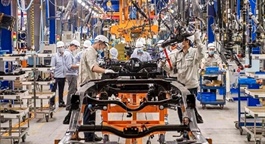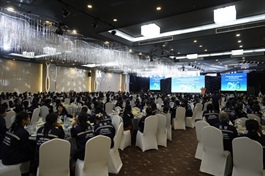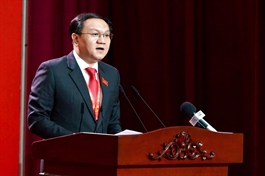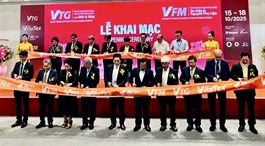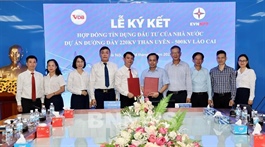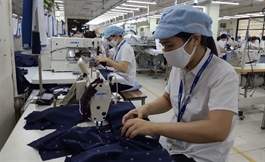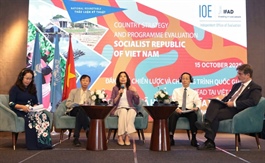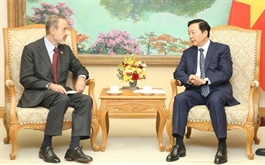Livestock industry must make haste on transformation
Livestock industry must make haste on transformation
A report by the Department of Livestock Production and Animal Health says over 30 per cent of domestic livestock output still from small-scale, scattered farms not connected to value chains. This fragmented model makes it difficult to control diseases, product quality, and trace origins.
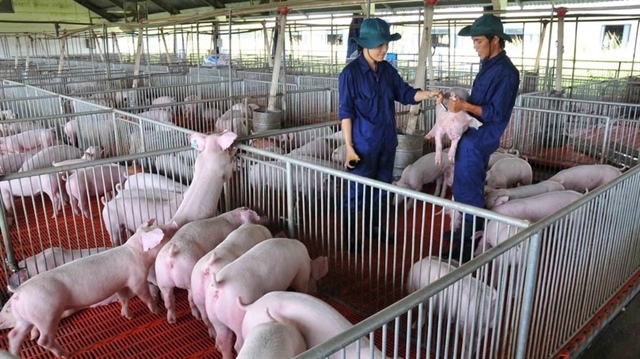
Woman farmers during health inspection routine at a pig farm in HCM City. VNA/VNS Photo |
Việt Nam’s livestock industry faces mounting pressure to modernise, with insiders and policy makers calling for urgent transformation across breeding, technology, environmental management and production organisation.
Fragmented
A recent report from the Department of Livestock Production and Animal Health under the Ministry of Agriculture and Environment indicates that over 30 per cent of domestic livestock output still comes from small-scale, scattered farms not linked to value chains. This fragmented model complicates disease control, product quality assurance and traceability.
Production costs are currently 10–20 per cent higher than in neighbouring countries, largely due to the high cost of feed and animal breeds. The country remains heavily reliant on imported raw materials such as maize and soybeans for feed, making it vulnerable to global price fluctuations.
Many high-quality breeds and vaccines are still imported, while modern livestock technologies are mainly applied by large enterprises. Smallholders often lack the resources to invest, resulting in significant productivity gaps across production models.
Consequently, African swine fever, avian influenza and foot-and-mouth disease continue to pose major threats. Despite prevention efforts, biosecurity systems at grassroots farms remain inadequate, particularly among small-scale operations. Each outbreak can cause heavy losses, discouraging farmers from restocking.
Around 70 per cent of meat on the market comes from small slaughterhouses located within residential areas and lacking proper hygiene control. Only 25–30 per cent of livestock products undergo deep processing, far below levels seen in developed countries. This limits export competitiveness and complicates quality control and national brand building.
Deputy Director of the Department of Livestock Production and Animal Health, Phạm Kim Đăng, said 2026 will be a pivotal year for the sector to transition towards more sustainable development.
“Livestock production has played a vital role in securing food supply for nearly 100 million Vietnamese people. However, the sector now faces intertwined opportunities and challenges that demand strong restructuring towards professionalism, sustainability and value-chain integration,” Đăng said.
Coordination
Deputy Director of the Hà Nội Department of Agriculture and Environment Tạ Văn Tường said the capital has more than 6,700 livestock farms, nearly 1,800 of which are medium or large scale. The city has developed 57 production–consumption chains that ensure a stable market supply even during disease outbreaks or supply disruptions.
He emphasised that achieving this goal requires stronger engagement from local authorities in zoning livestock areas, controlling small-scale slaughtering, and encouraging consumers to choose traceable, safe food products.
Director of Amavet Veterinary Medicine Company Nguyễn Văn Bách introduced the 'contact-free farming' model as a new approach to minimise disease transmission, especially African swine fever. Built on three protective layers—prevention, containment and non-contact—the model significantly reduces veterinary drug costs while maintaining herd productivity.
Meanwhile, Dabaco Poultry Breeding Company is investing heavily in vaccine research and biotechnology to enhance disease prevention and improve the quality of local poultry breeds.
“Only by investing in technology, genetics and management can we reduce costs and ensure sustainable competitiveness,” a Dabaco representative said.
Notably, a vertical farm model is being piloted in Tây Ninh and Phú Thọ. This system allows close monitoring, saves land and improves biosecurity. Although initial investment costs are high, it is seen as an inevitable trend in the sector’s modernisation.
- 08:21 16/10/2025



